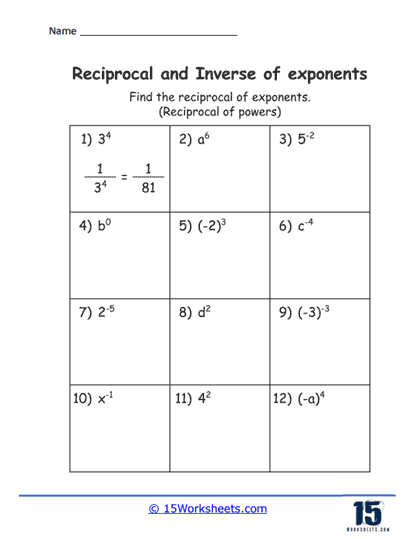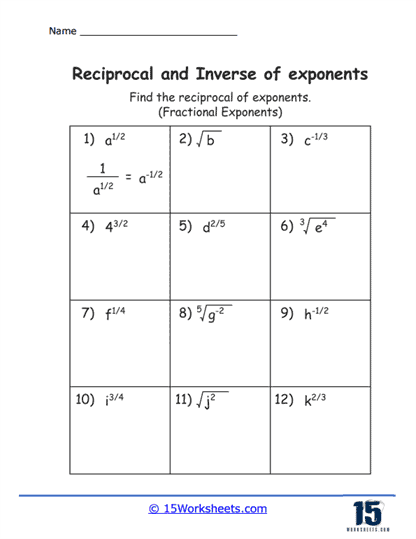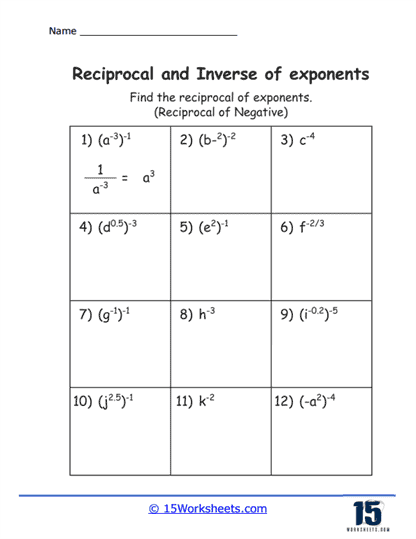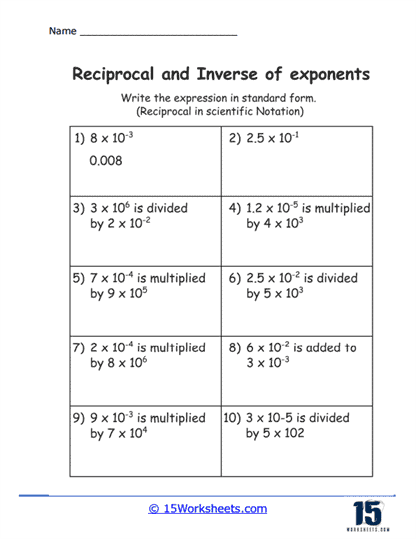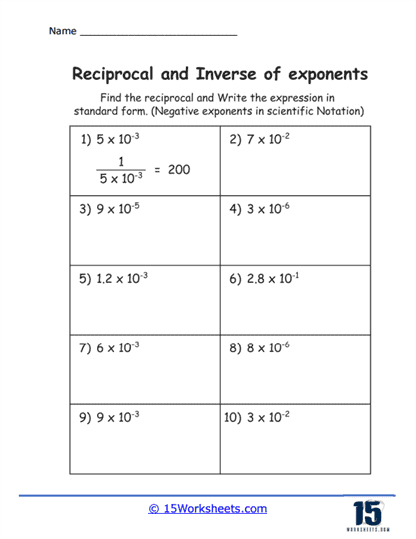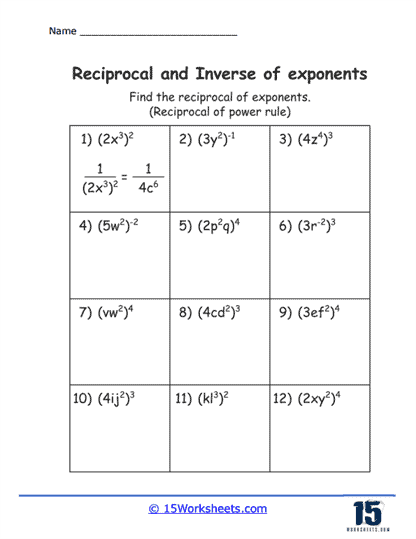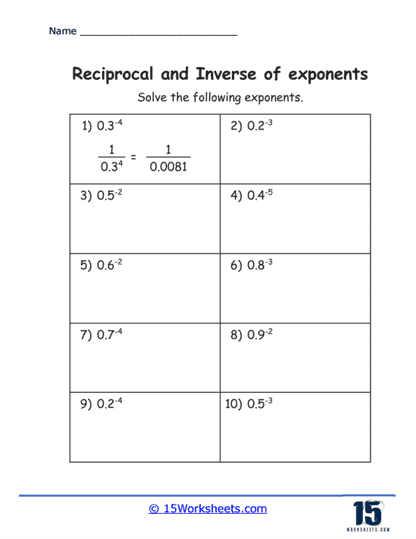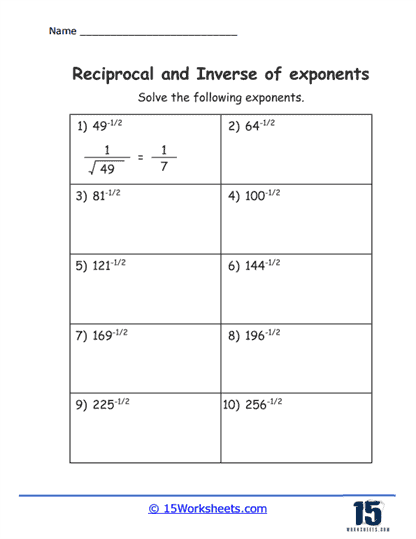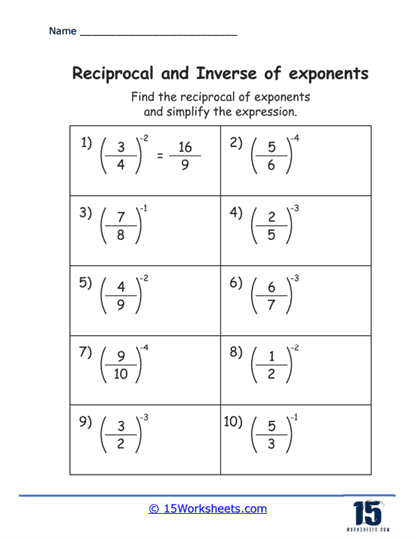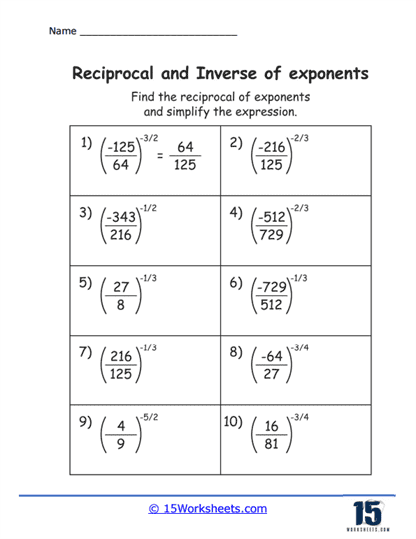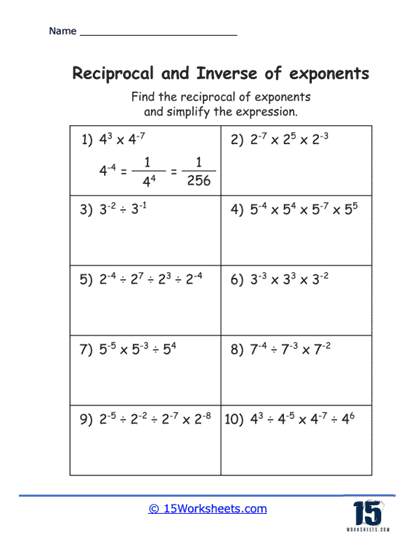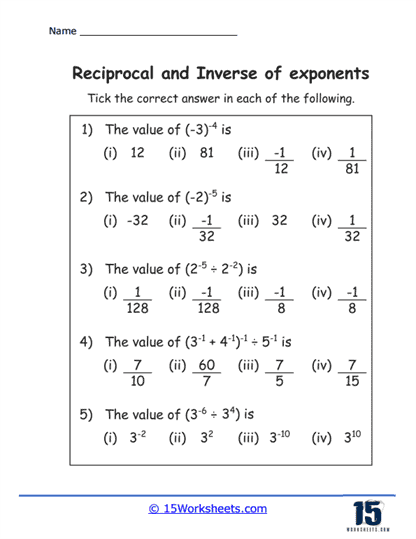Reciprocals and Inverses of Exponents Worksheets
About These 15 Worksheets
These worksheets were created to deepen students’ understanding of exponents by focusing on the concepts of reciprocals and inverse operations within the realm of exponentiation. These worksheets are an essential part of a comprehensive mathematics curriculum, aimed at enhancing students’ skills and knowledge in handling exponents in various mathematical operations. The practice provided by these worksheets is invaluable, not only in mastering the specific concepts of reciprocals and inverses but also in fostering a broader understanding of exponents and their applications in algebra, geometry, and beyond.
Reciprocals in mathematics refer to the inverse relationship in division. For any non-zero number a, its reciprocal is 1/a, and the product of a number and its reciprocal equals one. In the context of exponents, the reciprocal also applies to powers, where the reciprocal of an is a-n, demonstrating the property that a base raised to a negative exponent is equal to the reciprocal of the base raised to the positive exponent.
Inverses of exponents involve operations that undo the effect of exponentiation. The most common inverse operation is the logarithm, which determines what exponent the base must be raised to in order to produce a given number. Practicing with worksheets on these topics helps students navigate between the operations of exponentiation, finding reciprocals, and applying inverse functions like logarithms.
By engaging with a wide range of exercises, students not only develop a thorough understanding of reciprocals and inverses in the context of exponents but also enhance their overall mathematical proficiency. These worksheets lay a solid foundation for success in higher mathematics and related fields, demonstrating the integral role of practice in achieving mastery and confidence in mathematics. Through diligent study and application of these concepts, students can significantly improve their mathematical skills, opening the door to advanced studies and real-world applications.
Types of Exercises
These worksheets comprise a variety of exercises designed to address different aspects of reciprocals and inverses in the context of exponents:
Identifying Reciprocals – Exercises might start with identifying the reciprocal of a given number or expression involving exponents. This basic practice helps students familiarize themselves with the concept of reciprocals in a straightforward context.
Simplifying Expressions with Negative Exponents – Students will encounter problems requiring them to simplify expressions that include negative exponents, applying the rule that a-n = 1/an. These exercises reinforce the concept that negative exponents denote reciprocals.
Converting Between Forms – Some exercises focus on converting expressions with negative exponents to their reciprocal forms with positive exponents, and vice versa. This practice enhances students’ flexibility in working with different forms of expressions.
Applying Reciprocals to Solve Equations – More advanced worksheets may include problems where students must apply their understanding of reciprocals to solve equations involving exponents, including those where reciprocals provide the pathway to isolating variables.
Working with Logarithms – Since logarithms are the inverse operations of exponentiation, exercises will often include finding the logarithm of a number given the base, which requires understanding how to reverse the exponentiation process.
Real-World Problems – To connect theory with practice, some worksheets include real-world problems that can be solved by applying knowledge of reciprocals, negative exponents, and logarithms. These might involve scenarios from physics, chemistry, or finance.
The Benefits Of These Worksheets
Deepening Understanding of Exponent Rules – Through targeted practice, students solidify their understanding of the rules governing exponents, including how to handle negative exponents and the concept of reciprocals.
Enhancing Algebraic Skills – These worksheets improve students’ ability to manipulate and simplify algebraic expressions, a skill that is fundamental in algebra, calculus, and other areas of mathematics.
Developing Critical Thinking – The variety of exercises encourages students to approach problems from different angles, fostering critical thinking and problem-solving skills.
Preparation for Advanced Topics – A solid grasp of reciprocals, inverses, and their relationship to exponents prepares students for more advanced topics in mathematics and science, where these concepts are frequently applied.
Building Confidence – Mastery of these concepts through practice builds students’ confidence in their mathematical abilities, encouraging them to tackle more complex problems and concepts.

